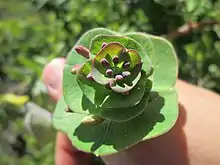Euphorbia pedroi
Euphorbia pedroi (Portuguese: Eufórbia-de-gomes-pedro) is a species of flowering plant in the family Euphorbiaceae endemic to the Arrábida Natural Park in Portugal. Its binominal name is dedicated to José Gomes Pedro (1915-2010) a Portuguese agronomist/botanist, who studied the flora and vegetation of Arrábida and Mozambique.[2]
| Euphorbia pedroi | |
|---|---|
 | |
| Scientific classification | |
| Kingdom: | Plantae |
| Clade: | Tracheophytes |
| Clade: | Angiosperms |
| Clade: | Eudicots |
| Clade: | Rosids |
| Order: | Malpighiales |
| Family: | Euphorbiaceae |
| Genus: | Euphorbia |
| Species: | E. pedroi |
| Binomial name | |
| Euphorbia pedroi Molero & Rovira | |
Description
Euphorbia pedroi is a sub-succulent shrub that can reach 2 m (6.6 ft) tall.[1] Leaves are 25 mm–60 mm × 4 mm–10 mm (0.98 in–2.36 in × 0.16 in–0.39 in), green or somewhat glaucous. Cyathium is 2.8–4 mm (0.11–0.16 in) with a 1–3 mm (0.039–0.118 in) peduncle, glabrous or slightly hairy both in the base and peduncle. Fruit is 4.2 mm–5 mm × 5.8 mm–7.2 mm (0.17 in–0.20 in × 0.23 in–0.28 in) yellowish-green or reddish, seeds are reddish brown, 2.8 mm–3.2 mm × 2 mm–2.3 mm (0.110 in–0.126 in × 0.079 in–0.091 in) and somewhat dorsiventrally flatened.[3]
Distribution and habitat
Euphorbia pedroi is native to the Arrábida Natural Park, specifically between Cabo Espichel and Sesimbra on the Setúbal Peninsula, in the Atlantic coast. It is found on slopes of south-facing limestone cliffs on incipient soils or rock cracks subjected to regular mist and strong winds.[1][2]
References
- Carapeto, A., Monteiro-Henriques, T., da Silva Menezes de Sequeira, M. & Rivers, M.C. (2017). "Monizia edulis". IUCN Red List of Threatened Species. 2017: e.T96430454A96430470. Retrieved 13 December 2020.CS1 maint: multiple names: authors list (link)
- "Euphorbia pedroi Molero & Rovira". Flora-on. Retrieved 13 December 2020.
- "E. pedroi" (PDF). Flora Iberica. Retrieved 13 December 2020.
